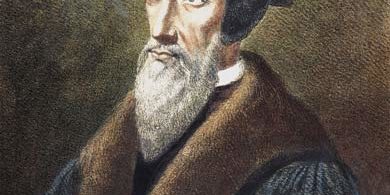
Calvin’s First Controversy Over Predestination (Paul Helm)
In the May issue of Credo Magazine, “Chosen by Grace,” Paul Helm has written an article taking us back to Calvin’s first controversy over predestination. In this new article Helm explores the historical context of Calvin’s debate with Bolsec as well as his theological argument.
But first, a little about the author. Paul Helm was educated at Worcester College, Oxford, and was for many years a member of the Philosophy Department of the University of Liverpool. From 1993-2000 he was the Professor of the History and Philosophy of Religion, King’s College, London. In 2001 he was appointed J.I. Packer Chair of Philosophical Theology at Regent College, Vancouver. He is presently a Teaching Fellow there. Helm is the author of numerous journal articles and books. Some of his most well-know books include Calvin and the Calvinists, Faith and Reason, The Trustworthiness of God, The Providence of God, Eternal God, The Secret Providence of God, The Trustworthiness of God (with Carl Trueman), John Calvin’s Ideas, Calvin at the Centre, and Calvin: A Guide for the Perplexed.
Here is the introduction to Helm’s article to get you started:
Geneva March 1551. It is over ten years since Calvin, now 42, has returned from his enforced exile in Bucer’s Strasbourg, no doubt having learned much from the way Bucer organised things in that city. Calvin is bent on cementing the work of Reformation in the church and the society of Geneva. For him this involves the tricky and contentious matter of distinguishing the jurisdiction of the church, which had to do with spiritual matters, and of the magistrate, who is the ‘minister’ of the gospel in civil affairs, charged with upholding and defending the one true church. Where is the line between the jurisdiction of each to be drawn?
The issue was soon to be put to the test. Jerome Bolsec, an ex-Carmelite monk, now a physician, appears in the city. He holds ‘certain mistaken opinions concerning free will and predestination,’ and is reprimanded by the pastors of Geneva (exactly whom, we are not told). He is summoned before the Consistory three times. He openly kept up his opposition to Calvin’s views. The story is that on the third of these occasions Calvin came into the meeting, slipping in unnoticed at the back. As soon as Bolsec had finished speaking Calvin stood up and offered a refutation, quoting passages from Augustine verbatim, which lasted for an hour! And then Bolsec was arrested. It appears that this was not what Calvin wanted, but rather that the matter be quietly dropped. Even in prison Bolsec kept up his opposition, slandering Calvin and the ministry more generally. The next we learn is of Bolsec’s trial, in October of that year, on a charge of promoting civil disorder, disturbing the peace by spreading his views in the city.
The Theological Issues
Bolsec denied Calvin’s teaching regarding eternal predestination, saying that the doctrine made God a tyrant. Instead he proposed that predestination is based on foreseen faith (and reprobation on foreseen unbelief), and so neither was ‘eternal’, or ‘absolute’. For on this understanding of the Word, God elects and predestines those whom he foresees will respond in faith to the gospel. In the views of the pastors of Geneva, headed by Calvin, such sentiments weakened the foundation of God’s sovereignty in the gift of his grace and was contrary to the clear teaching of Scripture. Although Calvin had private discussions with Bolsec before his trial, the significance of which will emerge later, he does not appear to have published any rebuttal. But he offered a written defence of the Genevan view in the form of an explicit refutation of Bolsec’s claims, provided in the trial as evidence of the likely disruptive effect of Bolsec’s public disputations.
Calvin focuses on the charge that in eternal (or absolute) predestination God is the author of sin, because in such predestination he necessitates the sinner to sin. That is, Bolsec concentrates his attention not so much on predestination as on reprobation. . . .
Read the rest of Helm’s article today!
The biblical doctrine of election is offensive. It collides with our demand for human autonomy. It removes our will from the throne. And it exposes our nakedness, revealing us to be the sinners that we truly are, undeserving of divine grace and mercy. But when our eyes are opened to its glory, we begin to see that the doctrine of election leads us to worship, praise, and give thanks to our Sovereign Lord. We recognize that we, as sinners, deserve nothing less than eternal condemnation. And yet, the God and Father of our Lord Jesus Christ has chosen us in Christ before the foundation of the world! In love he predestined us for adoption as sons through Jesus Christ, not on the basis of anything we have done, but purely according to the purpose of his will (Eph 1:3-5). It is this doctrine of election that Paul says is to lead us to praise the glorious grace of God (Eph 1:6). Therefore, the title of this May’s issue of Credo Magazine is “Chosen by Grace.” Contributors include: Timothy George, Paul Helm, Matthew Barrett, Bruce Ware, Fred Zaspel, Greg Gilbert, Thomas Nettles, R. Scott Clark, David Murray, Thomas Schreiner, Graham Cole, Greg Forster, and many others.


